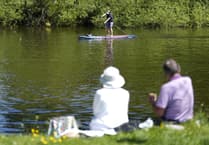ONE of the leading sportspeople to emerge from the forest, William ‘Billy’ Midwinter has a unique place in cricket history.
Midwinter’s parents, William John Midwinter and Rebecca Evans, were married at Parkend church in 1849, and he was born in 1851. The family’s home was at Lower Meend, St Briavels, in a cottage that now cannot be identified. They emigrated to Australia around 1860, and Midwinter became a professional cricketer, playing for Australia against England in the first ever test match in Melbourne in March 1877.
He returned to England to play cricket for his native Gloucestershire, which was captained by the legendary WG Grace, but was again selected to play for Australia on their tour of England in 1878. He met up with his Australian colleagues in London, where he was the central character ‘or victim’ in a ‘kidnapping’ event.
He was at Lords cricket ground, padded up and waiting to bat for the Australians against Middlesex, but the formidable WG Grace was expecting him to be playing for Gloucestershire against Surrey at the Oval. Grace commandeered a hansom cab to race across London. He grabbed the bewildered Midwinter and dragged him off to play for his county of birth. The Australians gave chase in a carriage of their own, but WG was not to be beaten. Midwinter played for the county that day. This caused a major diplomatic issue between the cricket authorities of the two countries, resolved only by a grudging apology by Grace.
Midwinter commuted between Australia and England between 1880 and 1882 to play cricket in the summers of both countries. He represented England in the Australian summer of 1881-2, thus becoming the only cricketer to play for Australia against England and for England against Australia. The following year, having returned to England, he re-emigrated to Australia to play for Australia against England again. He was perhaps the first international sporting mercenary, taking the long sea voyage from England to Australia many times to play cricket.
His life after cricket was profoundly sad. His wife and two of his children died, his business as a hotel manager failed, and he was confined in an ‘Asylum’ in Melbourne, where he died in 1890. It has been suggested that his death was by suicide.
Such was the tragic end to the life of a pioneering sporting personality. My attempt a couple of years ago to commemorate him with a plaque at the gates of St Briavels sports field was unsuccessful, but this extraordinary life needs some sort of recognition in his native village.
Dave adds: It was with great sadness that I heard of the death of Alastair Graham of Lydney. Alastair and I wrote weekly columns in the Citizen during the early 2000s. We never met, but I always admired his deep knowledge of Lydney and local industrial history, and especially of the cooperative movement. RIP Alastair.





Comments
This article has no comments yet. Be the first to leave a comment.